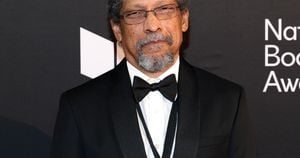World leaders gathered at the G20 summit held recently in Rio de Janeiro found themselves at a pivotal moment, as Brazilian President Luiz_Inácio_Lula_da_Silva urged them to take ambitious steps toward fulfilling global climate targets. During his closing address on November 19, Lula pushed for drastic measures to achieve net zero carbon emissions by 2040 or 2045, rather than the commonly accepted target of 2050. The backdrop to this bold proposal is alarming, with experts declaring this year possibly the warmest on record, underscoring the urgency of addressing climate change.
President Lula highlighted the increasingly severe climate disasters, such as floods and droughts, echoing the sentiment of "We have to do more and do it faster. There is no time to lose," making it clear the window for action is narrowing. The G20 nations, representing approximately 85% of the global economy and accounting for over three-quarters of carbon emissions, are seen as key players in combating climate change.
During the discussions, the harsh political winds were also evident, particularly with the specter of Donald Trump potentially returning to the US presidency. Such a change could result in the rollback of US commitment to climate agreements like the Paris Accord. Argentine President Javier Milei's recent visit to Trump added to the tension, as he voiced opposition to collective initiatives targeting gender equality, taxing billionaires, and sustainable development.
The G20 leaders reached consensus on various topics, including climate finance, which is especially significant. The joint statement released post-summit emphasized the necessity for rapid and substantial increases in climate financing, from billions to trillions of dollars. This increased funding aims not just to combat climate change but also to bolster the economies of developing nations, which face significant challenges impacted by changing climate conditions.
President Joe Biden echoed these sentiments, stating the imperative for developing countries to secure greater access to financial resources. He urged world leaders to recognize climate change as "the single greatest existential threat to humanity," urging sustained commitment and cooperation.
The summit did not shy away from criticizing developed nations either. Lula chastised wealthier countries for their failure to deliver the expected annual climate financing of $100 billion to developing nations, something they promised to achieve by the year 2020. This unmet commitment has emerged as one of the rivalling points during negotiations at the UN climate talks known as COP29, currently taking place in Azerbaijan.
The status of negotiations at COP29 has been particularly sluggish, with rich nations calling for broader contribution commitments from other nations. Conversely, representatives of developing countries argue for accountability from those most responsible for climate change. A clear message emerged from the G20 leaders: negotiators at COP29 must finalize the financial goals needed to support climate-related initiatives.
UN climate chief Simon Stiell underscored this sentiment, expressing hopefulness yet urgency, stating, "G20 leaders have sent a clear message to their negotiators at COP29: do not leave Baku without successfully establishing new finance goals." With negotiations set to conclude on November 22, there is great anticipation surrounding any definitive outcomes.
Adding to the commitments made, the G20 also prioritized addressing plastic pollution globally. Leaders agreed to establish a legally binding treaty for plastic reduction by the end of 2024, with discussions poised to resume shortly to finalize the details of this treaty.
One of the overarching themes of the G20 summit was clarity and globalization of climate funding mechanisms. Lula's acknowledgment of the lack of progress toward financing aims coupled with his proposals for establishing new councils within the United Nations painted the summit as not merely ceremonial but rather as actionable and goal-oriented.
"We can no longer afford to make only symbolic gestures. The stakes are too high," Lula emphasized, aiming for responsibility across all sectors and gases causing emissions, and hinting at the need for inclusive initiatives from broader segments of society.
With global leaders grasping the reins of the climate crisis, the fast-approaching deadlines and unyielding nature of climate impacts call for unprecedented cooperation and innovation. The world watches closely, as each nation's pledges and actions at these major summits could add to the potential for significant climate progress—or usher us closer to the brink of no return.
While the collective resolve is palpable, the upcoming weeks will be telling as COP29 negotiators face immense pressure to fulfill lofty promises made on the world stage. The dialogue around 'We can't wait' has never been more literal or urgent, setting the tone for what may come next as the global community gears up for the next phases of environmental accountability.



